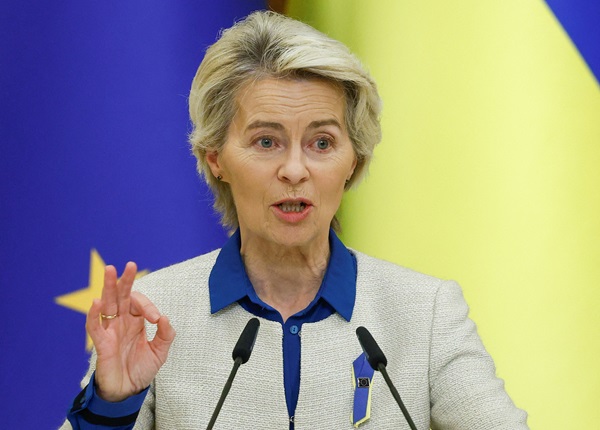 European Commission President Ursula Von der Leyen attends a joint press conference with Ukraine's President Volodymyr Zelensky (not pictured), amid the Russia-Ukraine conflict, in Kyiv, Ukraine, on 20 September 2024.;
Credit: REUTERS/Valentyn Ogirenko
European Commission President Ursula Von der Leyen attends a joint press conference with Ukraine's President Volodymyr Zelensky (not pictured), amid the Russia-Ukraine conflict, in Kyiv, Ukraine, on 20 September 2024.;
Credit: REUTERS/Valentyn Ogirenko
KYIV (Reuters) - European Commission President Ursula von der Leyen announced a loan of up to €35 billion for Ukraine during a visit to Kyiv on Friday 20 September 2024, saying it was needed to defend the country against Russian attacks and help it get through the winter.
Standing beside her at a joint press conference, Zelensky said the loan would be used for energy, air defences and arms procurement, and urged allies to approve by the end of the year a "victory plan" he has drawn up.
Visiting Kyiv at the start of her second term at the helm of the European Union's executive branch, von der Leyen said Ukraine needed the 27-nation bloc's continued support in the face of Russian attacks.
The loan is part of a wider plan among countries in the Group of Seven industrialised powers to raise funds using proceeds from Russian assets frozen to sanction Moscow for invading its neighbour.
"We will spend the money, these 35 billion, primarily on energy, on defence, as well as on bomb shelters for children in schools, nurseries and universities - this is a big deficit for us," Zelensky said in front of the Ukrainian and EU flags. "And on weapons, primarily those produced domestically, drones, missiles. Today, our long-range drones strike the enemy and they are cheaper than those (made by) our partners."
The G7 froze around $300 billion worth of Russian financial assets soon after Moscow's full-scale invasion of Ukraine in 2022. They pledged to use the funds to help their ally, but spent months discussing how exactly such a mechanism could work.
"Russia keeps targeting your civilian energy infrastructure in a blatant and vicious way to try and plunge your country into dark," von der Leyen said. "I am here to tell you... that the European Union is here to help you in this challenge to keep the lights on."
She said on Thursday that the sum of €160 million from the proceeds of frozen Russian assets would be allocated to meet Ukraine's urgent humanitarian needs for this winter.
Russia has knocked out about 9 gigawatts (GW) of Ukraine's energy infrastructure, which von der Leyen said was the "power equivalent of the three Baltic states."
She said that the EU aimed to restore 2.5 GW of power generating capacity and would increase exports to supply 2 GW of electricity to Ukraine.
VICTORY PLAN
Zelensky, who travels to the United States next week, said he would discuss his victory plan with US President Joe Biden when the two leaders meet. "Most of the decisions from the plan depend specifically on him (Biden). On other allies too, but there are certain points which depend on the goodwill and support of the United States," he said.
Zelensky has provided regular updates on the plan's preparation but has given few clues to the contents, indicating only that it aims to create terms acceptable to Kyiv. "The entire plan is predicated upon quick decisions from our partners. The plan is predicated upon decisions which should take place from October to December, and not delaying these processes," he said.
Russian President Vladimir Putin says peace talks can begin only if Kyiv abandons swathes of eastern and southern Ukraine to Russia and drops its NATO membership ambitions. Zelensky has called repeatedly for a withdrawal of all Russian troops, and the restoration of Ukraine's post-Soviet borders.
Russia's foreign ministry said on Friday the EU had "lost its mind" and was heading down a path to ruin by allocating additional funds in military aid to Ukraine.
Germany is set to approve close to €400 million in additional military aid to Ukraine, according to a finance ministry letter seen by Reuters. The funds are in addition to around €8 billion budgeted for Ukraine in 2024.








